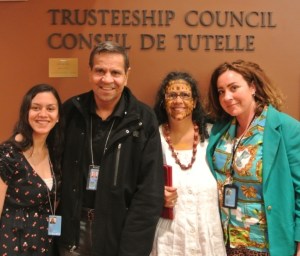
Full list below of Australian Indigenous organisations represented at the United Nations over the past two weeks
Previous communiques Health ,education and culture
Human rights of Indigenous Peoples in Australia press release below
The overrepresentation of Indigenous Peoples in child protection and criminal justice systems must be the next focus point of those working on Indigenous issues at the international level said a network of Australia’s Indigenous organisations at a United Nations forum in New York this week.
Brian Wyatt, Co-Chair of the Indigenous People’s Organisation (IPO) Network Australia said the IPO had made six recommendations to the United Nations Permanent Forum on Indigenous Issues (UNPFII) on the future direction of the Forum.
“Across the world, and especially in Australia, there is an appalling overrepresentation of Indigenous Peoples in the criminal justice and child protection systems. This is having devastating effects on Indigenous communities the world over.
“We suggest the issues need be studied in tandem because of their clear links. Indigenous children in care and protection often come into contact with the juvenile justice system and then in turn, the adult criminal justice system.
“Indigenous children and young people are vastly overrepresented in care and protection systems. In 2011-12, they were subjected to child protection substantiations at a rate of nearly eight times that of non-Indigenous children.
“They are also ten times more likely to be in out-of-home care (comprising 31% of all children in care), despite making up only 4.2% of the population of all children and young people.
“The statistics regarding contact between Indigenous Peoples and the justice system are also alarming. Our adults are 15 times more likely to be incarcerated and our youth are almost 24 times more likely to be in youth detention.
”We can’t ignore these statistics and let them continue. We have to do everything we can to identify their causes and explore ways to improve the prospects for our young people.
“There is a need for improved, standardised and aggregated data collection regarding criminal justice and child protection on a global level, to adequately understand the issues and put attention where it is most needed.
“We also need to better understand the impact it is having on our communities.”
The forum is currently wrapping up on the discussion on future work and directions for the rights of Indigenous peoples around the world. The final Report of the Forum was adopted and it was revealed that the theme for next years UNPFII will be Good Governance articles 3, 4, 5, 6 & 47 of the Declaration on the Rights of Indigenous Peoples.
Human rights of Indigenous Peoples in Australia
The human rights of Indigenous Peoples in Australia and across the world is under the spotlight at the United Nations Permanent Forum on Indigenous Issues (UNPFII) at UN headquarters in New York this week.
Brian Wyatt, Co-Chair of the Indigenous People’s Organisation (IPO) Network Australia said many countries were still falling behind in recognising the rights of their Indigenous Peoples.
“The Declaration on the Rights of Indigenous Peoples in 2007 by the United Nations General Assembly was a historic milestone in the international struggle by the World’s Indigenous Peoples towards acknowledgment and respect of their rights to development,” Mr Wyatt said.
“However we remain concerned that some countries are not doing much more than paying it lip service.
“In Australia, the Declaration is not even mentioned in the National Human Rights Action Plan or considered to be one of the human rights standards against which the rights of Indigenous Peoples can be measured.”
Mr Wyatt said the IPO had made two key recommendations to the UNPFII to address these issues.
“All countries need to embed human rights training and education into their bureaucracies including regular updates on the rights and standards contained in the Declaration and their relevance at the national and local levels.
“We also recommend that each country commit to developing a National Strategy with their Indigenous Peoples to give full effect to the Declaration.
“This would ensure the Declaration was used in a practical way to improve the lives of Indigenous Peoples in a meaningful way.
“A National Strategy would need to include monitoring, evaluation and annual reporting to ensure its effective implementation.”
The 12th Session of the United Nations Permanent Forum on Indigenous Issues is being held at the United Nations in New York from 20-31 May 2013.
The IPO is a broad affiliation of Aboriginal and Torres Strait Islander organisations and individuals, who engage with United Nations mechanisms and frameworks to advocate for the implementation of the Declaration.
The 12th Session of the United Nations Permanent Forum on Indigenous Issues is being held at the United Nations in New York from 20-31 May 2013.
The IPO is a broad affiliation of Aboriginal and Torres Strait Islander organisations and individuals, who engage with United Nations mechanisms and frameworks to advocate for the implementation of the Declaration.
First Peoples Disability Network Australia – Foundation for Aboriginal and Islander Research Action (FAIRA) – Foundation for Indigenous Recovery and Development, Australia (FIRDA) –
National Aboriginal Community Health Organisation (NACCHO)

– National Congress of Australia’s First People’s – National Aboriginal Torres Strait Islander Legal Services (NATSILS) – National Indigenous Higher Education Network (NIHEN) – National Aboriginal and Torres Strait Islander Women’s Alliance Corporation (NATSIWAC) – National Native Title Council (NNTC) – New South Wales Aboriginal Land Council (NSWALC) – Office of the Social Justice Commissioner.IPO Media:
IPONetworkAustralia@gmail.com
IPO Australia Ph: + 61 437 073 224 (Luke Briscoe)
IPO Facebook: https://www.facebook.com/pages/Indigenous-Peoples-Organisation-Network-Australia/190946244391874
IPO Twitter: https://twitter.com/IPOAustralia
Like this:
Like Loading...





